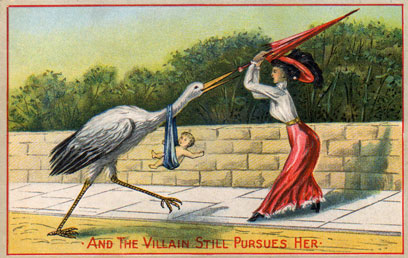Victorian postcard about contraceptives and maternity
Lisa Fullam, Associate Professor of Moral Theology and writer for Commonweal, argues that Roman Catholic guidance on contraception is unfortunately tied to physical structures, instead of the intention of the couple’s actions.
She explains that the current teachings, consistent with Pope Paul VI’s Humanae Vitae, are problematic because Paul VI was wrong about the physiology of sex, and secondly, because he focused more on the physiology of sex than the intentions between the couple performing the act.
From the article:
Human sex, though, should never be reduced to its physiological features. While the vast majority of human sex acts do not result in procreation, they are naturally ordered to the forging of ties between partners. To understand human sex is to focus first on its effects on whole persons, not on its biological outcome. This is the second way the vision of sex in Humanae vitae is unnatural: the criteria for acceptable methods of spacing children were described in terms not of the people involved, but of the physical act only. The whole person’s development as a sexual being in relationship with others was counted as less important than where and when a man ejaculates. And in a move away from Catholic moral tradition since Aquinas, the intention of the couple’s act was subjugated to a consideration of its physical structure.
The teachings not only contradict historical moral thought in focusing on an incorrectly understood physiological structure, but also contradict findings from within the RC church; Paul VI’s commission on birth control heard overwhelming testimony from Catholics who identified natural family planning as corrosive and harmful to their marriages.
Fullam also notes that the personal agency and self-determination Paul VI called for doesn’t exist for many women, despite his warnings that contraception would leave women more vulnerable.
Again from the article:
Paul VI warned that contraception would leave women vulnerable to sexual exploitation by men. Sadly, such abuse long predated the Pill. What reliable contraception does—especially contraception that women control—is give women greater determination over their reproductive lives, even if their partners are indifferent to their well-being and that of their children. What Humanae vitae described as self-indulgence sounds to many women like self-defense, or at least self-care and more responsible parenting.
In her conclusion, Fullam calls for a new approach, and an acknowledgment that the majority of Catholics do not follow Humanae Vitae or agree with the conclusions it reaches.
This is part of a 3 article series in Commonweal, with other articles by Catholic authors Marien Crowe and Christopher C. Roberts.
Taking a supportive position of Humanae vitae and NFP, Roberts argues that not using safe, reliable birth control methods is a personal virtue. Where Fullam advocates for the health of a marriage, acknowledgement of the physiological aspects of sex, and the human rights of women in her article, Roberts seems to focus on a more personal morality of self-denial and submission. He states that submitting to a rhythm outside of our control makes us more virtuous and moral.
He does acknowledge that NFP can take a toll on a marriage, especially in a number of corner cases he outlines, but he ends his article expressing the opinion that these instances are rare, suggesting that instead of economic stress and marital abuse, the problem arises from self-centered desires and a lack of moral fiber.
The last piece in the series, by Crowe, also supports NFP, but acknowledges that a blanket ban on contraceptives poses real challenges and issues for many couples and women, while questioning the physiology expressed in Humanae Vitae and the idea of moral weakness arising from the use of birth control.
From the article:
FOR ALL THESE reasons, I now believe that Humanae vitae offers the ideal way for married couples to live their sexual lives. Yet I still feel ambivalent about insisting that NFP is the onlyway for Catholics to limit the size of their family without committing grave sin. I would like to see the church promote NFP without condemning all other forms of contraception as “intrinsically evil.” I think it is this blanket condemnation that most Catholics still find so implausible. The fact that NFP has moral and cultural advantages does not make chemical contraception evil. Nor do the collateral effects of chemical contraception, however one assesses these. Although Pope Paul’s VI’s warnings about social effects of widespread use of contraception were prescient, we must put them in perspective. The sexual chaos of the past four decades came about not because married Catholics disobeyed the church and used contraception but because unmarried people took advantage of the ease and availability of contraception to have casual sex. In other words, it was promiscuity and the commodification of sex—not married couples using the Pill—that led to the social disruptions the pope foresaw. The advent of the Pill may have facilitated promiscuity, but that doesn’t make it intrinsically evil. (Drinking also facilitates promiscuity. Does that make alcohol intrinsically evil?) Instead of fixating on the evils of artificial contraception, Catholics would do well to concentrate on rehabilitating respect for the virtue of chastity, which has become a kind of joke in our culture.
Essentially, Roberts argues for reinforcing the Catholic focus on NFP and strengthening the bans on contraceptives, Crowe supports NFP and easing prohibitions on contraceptives, and Fullam advocates a new approach that acknowledges the issues she raises in her article and the choice by most Catholics to ignore the prohibition on contraceptives.
Why do you think so many Catholics do not follow the prohibitions on contraceptives? Do you think it’s time for the RC Church to reconsider this?
Posted by David Streever

